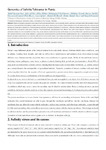Plant Genomics. Chapter 11: Genomics of Salinity Tolerance in Plants

View/
Date
2016Author
Rao, Abdul Qayyum
Din, Salah ud
Akhtar, Sidra
Metadata
Show full item recordAbstract
Plants are frequently exposed to wide range of harsh environmental factors, such as drought, salinity, cold, heat, and insect attack. Being sessile in nature, plants have developed different strategies to adapt and grow under rapidly changing environments. These strategies involve rearrangements at the molecular level starting from transcription, regulation of mRNA processing, translation, and protein modification or its turnover. Plants show stress-specific regulation of transcription that affects their transcriptome under stress conditions. The transcriptionally regulated genes have different roles under stress response. Generally, seedling and reproductive stages are more susceptible to stress. Thus, stress response studies during these growth stages reveal novel differentially regulated genes or proteins with important functions in plant stress adaptation. Exploiting the functional genomics and bioinformatics studies paved the way in understanding the relationship between genotype and phenotype of an organism suffering from environmental stress. Future research programs can be focused on the development of transgenic plants with enhanced stress tolerance in field conditions based upon the outcome of genomic approaches and knowing the mystery of nucleotides sequences hidden in cells.
Collections
- Education [806]
